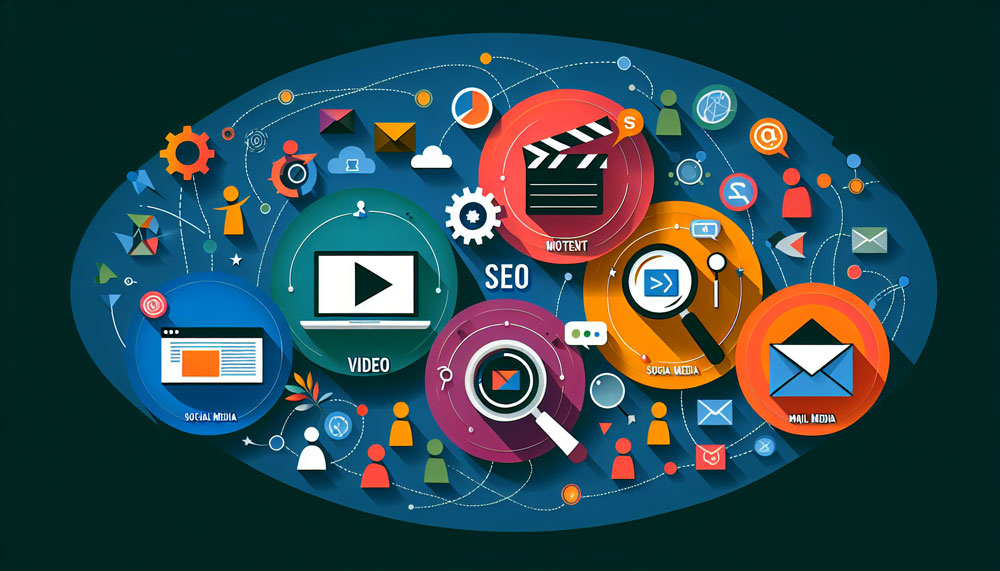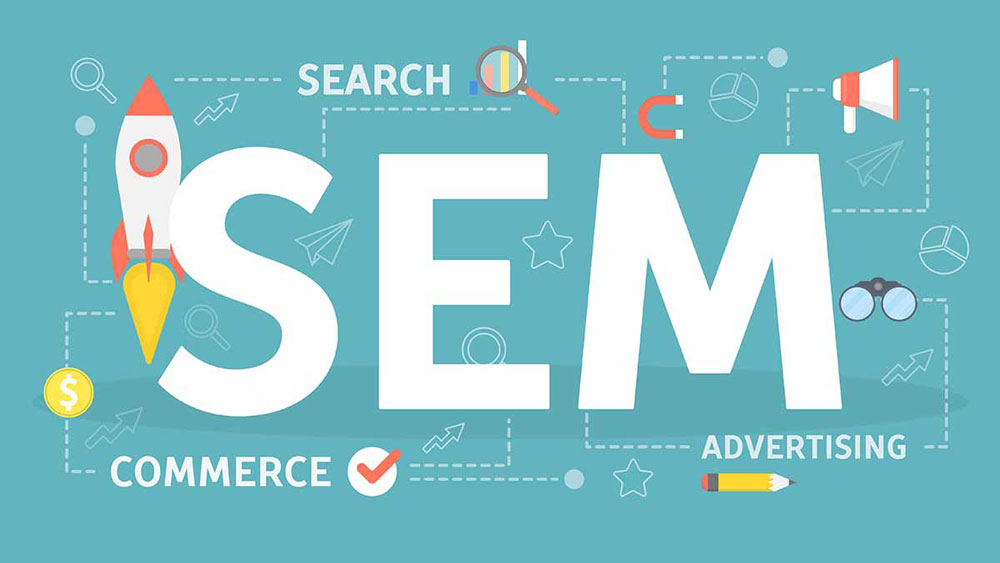
What is digital marketing? Simply put, it’s an essential practice for any business looking to thrive in today’s online world. This guide will walk you through how digital marketing uses online tools and platforms to attract, engage, and convert audiences globally. Here, you’ll discover why it matters and how leveraging strategies like SEO, pay-per-click, and social media can amplify your business’s online presence.
Table Of Contents
Key Takeaways
- Digital marketing is an expansive and essential tool for modern businesses, encompassing various strategies like SEO, social media, and content marketing to connect with a global audience and foster customer relationships.
- Effective digital marketing campaigns are underpinned by SMART goals, targeted audience profiling, strategic budgeting across various channels, and continual monitoring and optimization to maximize return on investment.
- The digital marketing landscape is continuously evolving, with current trends including artificial intelligence (AI), virtual and augmented reality, and personalized marketing experiences, which offer new ways for businesses to engage with consumers.
Defining Digital Marketing

Digital marketing is a vital element for the survival of modern-day businesses. It refers to various marketing activities that utilize digital channels to reach out and engage with prospective customers, such as:
- Marketing on social media platforms
- Distribution of email newsletters
- Optimisation for search engines (SEO)
- Campaigns involving pay-per-click (PPC) advertising
Each engagement online between a company and its customer base falls under the umbrella of digital marketing.
It’s important to recognize that digital marketing transcends mere advertisement. It aims at forging significant connections with consumers while delivering value during every exchange.
The Evolution Of Digital Marketing
Digital marketing’s origins go back to the decade of the 1990s. Recall AT&T’s inaugural clickable banner advertisement in 1994? This marked the start of an extraordinary evolution. Over time, digital marketing has transformed from a simple one-directional communication channel into a sophisticated medium for interactive and precise marketing endeavors.
With the advent of social media platforms in the 2000s, digital marketing took on an even more user-focused aspect, making it unprecedentedly centered around consumers.
Key Components Of Digital Marketing

Imagine your digital marketing strategy as a complex puzzle, each piece essential in crafting the full picture. Central elements of this strategy include:
- Content marketing, aimed at informing and captivating your audience
- Search Engine Optimisation (SEO), critical for boosting organic website traffic
- Social media platforms, providing interactive arenas to connect with customers
- Email marketing, creating a direct channel for customer communication
- Mobile marketing which targets users on their smartphones
Together, these integral pieces substantially bolster an all-encompassing digital marketing approach that can markedly amplify business achievement.
Why Is Digital Marketing Important?
Digital marketing stands as the cornerstone for modern enterprises, acting as a pivotal element that unlocks myriad prospects ranging from amplifying brand visibility to catalyzing business expansion. The size of the global digital advertising and marketing sector is expected to balloon to an impressive $786.2 billion by 2026, underscoring its escalating significance.
Digital marketing provides a plethora of advantages.
- It serves as a conduit connecting companies with their intended consumer base
- It facilitates access to an expansive pool of over 5 billion internet users worldwide
- It allows for messages tailored towards particular user groups which enhances investment returns
Indeed, the extensive reach afforded by digital marketing renders it indispensable in contemporary business strategy.
Thus, regardless if one runs a burgeoning small enterprise or oversees marketing within a vast corporate entity, leveraging digital tools in your promotional endeavors is not just recommended. It’s essential.
Inbound Marketing versus Digital Marketing
Digital marketing and inbound marketing are essentially two sides of the same coin. Inbound marketing zeroes in on drawing customers with content and experiences specifically designed to be valuable for them, whereas digital marketing covers a broader spectrum of activities conducted over the internet such as employing imagery, graphics, and brand logos.
Put simply, while inbound marketing seeks to garner customer interest naturally, digital marketing may encompass more straightforward advertising efforts. These distinct strategies converge on a mutual objective: engaging and attracting consumers through online channels.
Advantages Of Digital Marketing

Digital marketing acts as a potent tool, offering an array of advantages to companies that utilise it. The benefits are multifaceted and significant.
- Reduced expenses
- Targeted reach
- Enhanced return on investment (ROI)
- Greater cost efficiency compared to conventional marketing approaches
Specifically, SEO shines as an economical approach which surpasses the sustainability and expense of paid advertising. Digital marketing campaigns offer the invaluable benefit of measureability, allowing companies to monitor their campaign effectiveness and fine-tune their tactics instantaneously.
Expanding Market Reach
Digital marketing acts as a powerful tool that shatters geographical constraints, similar to how a sledgehammer brings down a wall. This strategy enables companies to:
- Broaden their market scope beyond local confines
- Penetrate international markets
- Connect with prospective customers across the globe
- Break free from spatial restrictions
Leveraging platforms such as social media and employing strategies like content marketing, digital marketing offers enterprises an opportunity to engage with audiences worldwide.
The result is the transformation of businesses from mere local entities into expansive global operations.
Enhancing Customer Engagement
Unlocking significant customer engagement is at the heart of digital marketing. By tailoring their marketing approaches, companies can forge a profound bond with their clientele. Digital channels allow for immediate interaction, providing the means for businesses to swiftly and effectively respond to customer enquiries.
Digital marketing ensures a consistent experience across various platforms — from emails to social media — maintaining customer involvement throughout all phases of communication.
Essential Digital Marketing Strategies
In the journey through the complex terrain of digital marketing, applying effective digital marketing techniques is key to a business’s triumph. A diverse array of tools at a digital marketer’s disposal encompasses:
- Social media marketing
- Search engine optimisation (SEO)
- Pay-per-click advertising (Google Ads, Microsoft Ads, Facebook Ads etc)
- Affiliate strategies
- Content creation and dissemination
- Marketing automation processes
- Video-based promotional activities
- Direct email outreach efforts
- Mobile-centric campaigns
These distinct methodologies each serve specialised functions. When utilised in synergy, they have the power to drive a business forward toward its objectives.
Content Marketing

At the heart of digital marketing lies content marketing, which is essential in disseminating valuable information to capture and retain the attention and awareness of consumers. This strategy encompasses the production and distribution of various forms of online materials, including blog posts, case studies, and whitepapers that are designed specifically to draw in and captivate a target audience.
Content creation within this context goes beyond mere publication. It’s about crafting narratives that strike a chord with viewers. It’s about generating material that doesn’t just exist but speaks directly to those you’re trying to reach – material with a story behind it.
Search Engine Optimisation (SEO)

Search Engine Optimisation (SEO) serves as the catalyst for driving traffic to websites. By enhancing a site’s presence on search engines, SEO ensures that it connects with the appropriate audience precisely when they need it. This process aids businesses in amplifying their online footprint and elevating organic website traffic.
One must bear in mind that the essence of SEO lies not merely in attracting an increased volume of visitors but rather in drawing visitors who have a genuine interest in what your business provides. It is about quality engagement over sheer quantity.
Social Media Marketing

Marketing through social media serves as a bridge that links companies to their consumers. This approach includes leveraging various social media platforms in order to:
- advertise products or services
- engage with a broad and varied clientele
- disseminate news and updates
- address customer inquiries
- introduce new offerings
Employing strategies for marketing on social media enables businesses to interact promptly with their customers, thereby cultivating robust connections with them.
Search Engine Marketing

Digital marketing strategies often leverage the potency of search engine marketing (SEM) to enhance a website’s prominence on search engine results pages (SERPs). This is commonly achieved by employing paid advertising tactics. By doing so, SEM enables companies to tap into a wider consumer base, funneling increased web traffic and thereby escalating their revenue generation.
Pay-per-click Marketing
PPC marketing serves as a rapid vessel, propelling companies in the direction of their intended market. This approach necessitates compensating for every individual click on an advertisement – essentially purchasing site traffic rather than acquiring it through natural means.
The expedited access to one’s target audience afforded by PPC marketing makes it a potent tool for enterprises aiming to enhance their presence on the internet.
Affiliate Marketing
Affiliate marketing operates as a symbiotic relationship. This model requires collaborating with an affiliate, which is essentially an external website, to advertise a good or service. In return for their promotional efforts, the affiliate earns a commission for every sale made.
By engaging in this partnership, companies can tap into broader markets and attract additional visitors to their site. Subsequently, it increases their chances of boosting sales revenue through increased traffic.
Influencer Marketing
By teaming up with individuals who command a significant and active following on social media, influencer marketing serves as an effective loudspeaker for a company’s communications. These partnerships are instrumental in extending the reach of their product or service promotion, which can significantly elevate brand awareness and funnel additional traffic to business websites.
Marketing Automation
Marketing automation serves as an invaluable aid to digital marketers, functioning like a personal aide in their marketing endeavors.
This technology streamlines various tasks through software applications—such as dispatching emails, scheduling social media posts, and monitoring website traffic—which not only conserves precious time but also enhances the effectiveness with which companies engage with their target audiences, thereby optimising overall marketing efforts.
Video Marketing
Video marketing serves as a cinematic preview for a company, utilising video content to advertise products or services, enlighten potential customers, and expand its reach. This medium can significantly assist enterprises in captivating their target audience, communicating messages with greater impact, and increasing the influx of visitors to their online platforms.
Email Marketing
Email marketing creates a direct communication channel between a company and its clientele. It encompasses the dissemination of emails to an array of individuals with the intent to publicise a product or service, educate consumers, or foster customer loyalty.
By leveraging email marketing, companies can directly engage with their target audience, thereby enhancing their overall marketing endeavors and increasing revenue.
Mobile Marketing
Marketing through mobile devices, like smartphones and tablets, offers businesses a swift avenue to expand their customer base. The increasing use of these mobile technologies enables companies to enhance their online presence, access a wider audience more effectively, and consequently amplify sales via the realm of mobile marketing.
Offline Digital Marketing Overview
As the realm of the digital world continues to grow, there remains a steadfast presence of offline marketing tactics. Whether through direct mail, print ads, outdoor billboards or broadcast media channels, these traditional forms of marketing provide a distinctive flavor amidst today’s landscape dominated by online engagement.
Similarly, opportunities like trade shows and networking events grant companies the chance to present their offerings face-to-face with prospective customers. This personal approach can forge memorable connections that resonate well beyond initial encounters in an increasingly virtual marketplace.
SMS Marketing
In today’s smartphone-dominated era, SMS marketing emerges as a formidable asset for companies. It provides the capability to push notifications and promotional content instantly to consumers’ mobile devices. Boasting an impressive 98% average open rate, SMS marketing secures notable exposure and promptness that can substantially enhance business marketing efforts.
QR Codes
QR codes act as a bridge linking the tangible world to the digital space. By embedding them in physical entities such as printed advertisements, product packaging, or point-of-sale displays, they facilitate an enriched interaction with customers and promote increased engagement.
With the rise of touchless engagements becoming more prevalent, QR codes have become an instrumental asset for companies aiming to blend their traditional marketing tactics with their digital marketing initiatives.
The Benefits Of Digital Marketing
Digital marketing provides a range of advantages such as:
- Being economical
- Expanding the reach across various regions
- Simplifying personalisation efforts
- Enhancing customer relationships
- Delivering measurable outcomes
- Facilitating straightforward and hassle-free conversions
Regardless if you’re at the helm of a burgeoning small enterprise or steering the marketing division in a large-scale company, embedding digital marketing strategies within your organisational framework can be instrumental in realising your business ambitions and driving triumph.
Cost Efficiency
Digital marketing is a boon for businesses watching their budgets closely. It does away with the physical collateral and logistical hurdles intrinsic to traditional marketing techniques. It facilitates sharper audience targeting, minimising expenses related to engaging non-prospective customers.
Small enterprises working within tight financial confines gain numerous advantages from online advertising platforms.
- They welcome companies regardless of budget size due to an absence of mandatory minimum spend
- They provide sophisticated tracking and analytics instruments that enable immediate fine-tuning of campaigns
- They heighten efficacy while simultaneously curtailing expenditures on ineffective ads.
A Broad Geographic Reach
Digital marketing’s scope is limitless, providing enterprises with the capability to:
- Instantly connect with a vast audience around the world
- Surpass geographic restrictions associated with traditional marketing techniques
- Employ social media, content marketing, and SEO strategies to engage potential customers across the globe
By leveraging diverse digital marketing tactics, businesses gain an avenue for widening their influence and interacting with audiences internationally through digital platforms.
Thanks to its worldwide scale, digital marketing enables companies to target consumers in various time zones. This opens up opportunities for continuous customer engagement and uninterrupted promotional activities.
Easier Personalisation
Digital marketing serves as a bespoke tailor, meticulously creating individualised strategies for each customer. It facilitates the customisation of marketing initiatives according to the unique desires and interests of every consumer.
Through channels like email marketing, content marketing, or social media marketing, companies are capable of developing personalised communications and experiences that align with their audience’s preferences—thereby enhancing their overall marketing efforts and elevating sales figures.
More Connection With Customers
Digital marketing forges a bond between companies and their clientele, enabling reciprocal communication that strengthens customer relationships. Through various channels such as email marketing, social media, or content marketing, firms are able to engage with consumers directly—responding to inquiries, resolving issues and meeting consumer demands in real-time.
Such engagement not only enhances the satisfaction of customers, but also cultivates loyalty among them. This in turn propels the expansion of businesses.
Quantifiable Results
Digital marketing acts as a navigational tool, guiding companies on the path to achievement. It offers measurable outcomes, enabling enterprises to gauge the success of their marketing endeavors.
From tallying visits on websites and observing interactions on social media platforms to examining email open rates, digital marketing delivers an understanding of consumer actions that assists businesses in refining their approaches and securing improved outcomes.
Easy & Convenient Conversions
Digital marketing serves as a rapid transit system, transporting consumers from initial awareness directly to the point of purchase. It streamlines the conversion process, enabling customers to effortlessly acquire products or services via mere clicks.
The ease and convenience of buying are enhanced whether it happens on an e-commerce platform, through a social media advertisement, or within an email marketing campaign. Digital marketing enhances the customer journey while simultaneously elevating sales figures.
Implementing A Successful Digital Marketing Campaign
A digital marketing campaign that hits its mark functions seamlessly, much like a finely calibrated engine. This entails:
- Establishing SMART objectives
- Pinpointing the intended audience
- Distributing funds across various digital channels
- Continually tracking and tweaking campaigns guided by performance metrics.
No matter if you’re helming a fledgling enterprise or orchestrating strategies for an expansive global company, rolling out an effective digital marketing campaign can propel you toward realising your business ambitions and garnering triumphs.
Setting SMART Goals
Implementing SMART goals—Specific, Measurable, Achievable, Relevant, Time-bound—is essential in charting a course for your digital marketing strategy. It offers precise guidance to enhance the effectiveness of your marketing endeavors and aids in maintaining focus on accomplishing business objectives.
These well-defined goals are instrumental whether the aim is to amplify brand awareness, attract additional website visitors or escalate sales figures.
Identifying The Target Audience
Determining your target audience is akin to assembling the right pieces of a puzzle. It requires knowledge of who your customers are, their desires, and the methods by which you can connect with them. Utilising tools such as market research, customer surveys, or analytics from social media enables you to tailor marketing campaigns that resonate more effectively and yield superior outcomes.
Allocating Budget For Digital Channels
Determining the investment for digital marketing channels requires assessing the potential return on investment (ROI) of each channel. Essential digital marketing avenues to consider for budget allocation are:
- Social media platforms
- Email campaigns
- Search engine optimisation strategies
- Pay-per-click advertising models
By designating funds across these varied digital channels, your marketing initiatives can be optimised to yield enhanced outcomes.
Monitoring & Refining Campaigns
Just as tuning a musical instrument is essential to achieving the perfect sound, tracking and analysing your marketing campaigns’ performance and then making the requisite modifications are critical for optimisation.
Fine-tuning aspects such as social media approach, enhancing email engagement rates, or honing in on your SEO practices allows you not only to elevate your campaign outcomes but also significantly increase the return on investment.
Emerging Digital Marketing Trends
In the fast-evolving landscape of digital marketing, a host of modern trends are constantly surfacing to redefine how businesses connect with their audience. Among these emerging trends that are setting the direction for digital marketing’s future we find:
- The growing implementation of artificial intelligence
- The burgeoning advancement in augmented reality and virtual reality technologies
- The upswing in influencer marketing practices
- The broadening scope of video marketing strategies
- An increased concentration on tailored personalised marketing efforts
- A strengthening focus on optimising for voice search capabilities
Such advancements offer companies fresh opportunities to captivate their target market and fulfill their promotional objectives.
Artificial Intelligence In Digital Marketing
Intelligent machines, functioning as the central processing unit of digital marketing, are leveraging Artificial Intelligence (AI) to enhance task automation, data analysis, and customer engagement. AI’s integration into various facets such as chatbots for communication, personalised product suggestions or predictive analytics is revolutionising how companies execute more tailored and effective marketing campaigns.
Virtual Reality & Augmented Reality
Augmented Reality (AR) and Virtual Reality (VR) are transforming digital marketing by offering mesmerising, immersive experiences that captivate consumers like never before. These technologies allow for interactive activities such as 3D product visualisations, virtual property walkthroughs, or even gamified aspects within a marketing campaign.
By leveraging VR and AR, companies can distinguish their brand in the marketplace and forge deeper connections with their audiences through innovative engagement methods.
Collaborating With A Digital Marketing Agency
Partnering with a digital marketing agency means gaining an ally in your corner. Businesses benefit from professional advice, insights into industry trends, and customised online campaigns designed to meet their unique objectives.
No matter if you run a small enterprise or hold a leadership role in the marketing department of a global company, working alongside a digital marketing agency offers the assistance required to master the intricacies of the digital world and realise triumphs.
Selecting The Right Agency
Choosing an appropriate digital marketing agency is akin to finding the ideal pair of shoes – it must align well with your preferences, offer comfort, and meet your specific requirements.
The proficiency of the agency in digital marketing, their strategy towards these efforts, and their grasp on your business objectives are critical factors that can profoundly influence the success of your marketing endeavors and determine the outcomes you attain.
Maximising Agency Partnership
To get the most out of a collaboration with a digital marketing agency, it’s akin to fully utilising a gym subscription. This requires engaging actively in the strategy, contributing your insights and remaining receptive to suggestions.
By ensuring consistent communication, establishing precise objectives or embracing constructive criticism, you can enhance your alliance with a digital marketing agency. Such an approach will significantly improve outcomes and optimise the effectiveness of your marketing efforts.
Summary
Digital marketing serves as a navigational instrument leading enterprises to victory. It provides a plethora of techniques ranging from SEO, social media marketing, content marketing to email marketing, enabling companies to connect with their target market, captivate them and fulfill business objectives.
With advancements such as AI (artificial intelligence), VR (virtual reality) and AR (augmented reality) on the horizon, digital marketing’s future promises even more creative and engaging experiences for consumers. Embracing digital marketing is an essential move not only for small-scale entrepreneurs but also for high-ranking officials in global firms—it transcends mere fad status and becomes a calculated choice that can propel your company towards triumph.
Frequently Asked Questions
What is digital marketing in simple words?
Utilising online platforms for the promotion of products or services, digital marketing aims to connect with prospective customers. This encompasses a diverse array of channels including social media, email, search engines, among others.
What are the 4 types of digital marketing?
Four essential varieties of digital marketing to contemplate for your enterprise include social media marketing (SMM), search engine optimisation (SEO), search engine marketing (SEM), and content marketing. Employing these tactics will enable you to connect with and captivate your target audience efficiently.
What does a digital marketer do?
A digital marketer uses digital channels to reach customers, build brand awareness, and promote products and services through a unique blend of planning, creativity, and strategy.
How do I start digital marketing?
Embarking on a career in digital marketing involves mastering the fundamentals, establishing your own website, and honing skills in SEO. Earn certifications for Google Ads and Facebook Ads to validate your expertise. To acquire hands-on experience, pursue internships or take up freelancing opportunities. Enhance your knowledge by enrolling in online courses, maintaining a blog for practical application, and engaging with industry experts through networking events to jumpstart your journey into digital marketing.
What are the benefits of digital marketing?
Digital marketing offers a plethora of advantages, such as affordability, the ability to extend reach across vast geographic locations with ease, enhanced personalisation capabilities, the development of more robust relationships with customers, measurability of campaign effectiveness in real-time and seamless facilitation for customer conversions. Businesses from various sectors and sizes can harness these numerous benefits that digital marketing brings.



